

Clarence Thomas - wikipedia. Clarence Thomas (born June 23, 1948) is an Associate Justice of the Supreme Court of the United States.
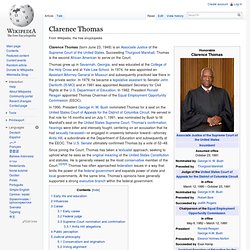
Succeeding Thurgood Marshall, Thomas is the second African American to serve on the Court. In 1990, President George H. W. Bush nominated Thomas for a seat on the United States Court of Appeals for the District of Columbia Circuit. He served in that role for 16 months and on July 1, 1991, was nominated by Bush to fill Marshall's seat on the United States Supreme Court.
Since joining the Court, Thomas has taken a textualist approach, seeking to uphold what he sees as the original meaning of the United States Constitution and statutes. Early life and education[edit] Clarence Thomas was born in 1948 in Pin Point, Georgia, a small, predominantly black community near Savannah founded by freedmen after the American Civil War. Thomas was the only black person at his high school in Savannah, where he was an honor student.[11] He was raised Roman Catholic. Influences[edit] Career[edit] Monsanto Co. v. Geertson Seed Farms. Monsanto Co. vs.
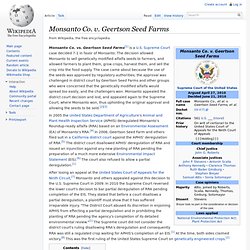
Geertson Seed Farms[1] is a U.S. Supreme Court case decided 7-1 in favor of Monsanto. The decision allowed Monsanto to sell genetically modified alfalfa seeds to farmers, and allowed farmers to plant them, grow crops, harvest them, and sell the crop into the food supply. The case came about because the use of the seeds was approved by regulatory authorities; the approval was challenged in district court by Geertson Seed Farms and other groups who were concerned that the genetically modified alfalfa would spread too easily, and the challengers won. Monsanto appealed the district court decision and lost, and appealed again to the Supreme Court, where Monsanto won, thus upholding the original approval and allowing the seeds to be sold.[2][3] After losing an appeal at the United States Court of Appeals for the Ninth Circuit,[7] Monsanto and others appealed against this decision to the U.S. Background[edit] Alfalfa seeds Parties[edit] Granting of certiorari[edit] Issues[edit]
MONSANTO CO. v. GEERTSON SEED FARMS. MONSANTO CO. et al.
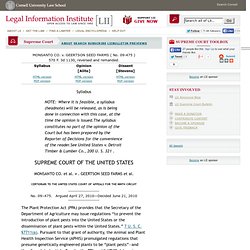
V . GEERTSON SEED FARMS et al. certiorari to the united states court of appeals for the ninth circuit No. 09–475. Argued April 27, 2010—Decided June 21, 2010 The Plant Protection Act (PPA) provides that the Secretary of the Department of Agriculture may issue regulations “to prevent the introduction of plant pests into the United States or the dissemination of plant pests within the United States.” 7 U. In determining whether to grant nonregulated status to a genetically engineered plant variety, APHIS must comply with the National Environmental Policy Act of 1969 (NEPA), which requires federal agencies “to the fullest extent possible” to prepare a detailed environmental impact statement (EIS) for “every … major Federal actio[n] significantly affecting the quality of the human environment.” 42 U. Ex Monsanto Lawyer Clarence Thomas to Hear Major Monsanto Case.
In Monsanto v.
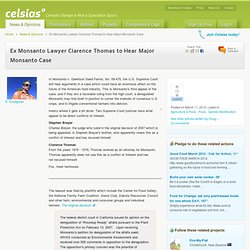
Geertson Seed Farms, No. 09-475, the U.S. Supreme Court will hear arguments in a case which could have an enormous effect on the future of the American food industry. This is Monsanto's third appeal of the case, and if they win a favorable ruling from the high court, a deregulated Monsanto may find itself in position to corner the markets of numerous U.S. crops, and to litigate conventional farmers into oblivion. Here's where it gets a bit dicier. Two Supreme Court justices have what appear to be direct conflicts of interest. Stephen Breyer Charles Breyer, the judge who ruled in the original decision of 2007 which is being appealed, is Stephen Breyer's brother, who apparently views this as a conflict of interest and has recused himself.
Clarence Thomas Rules on Monsanto Cases, Former Monsanto Attorney. OccupyWallStNYC : "Our once revered Supreme Court... Supreme Court sympathetic to Monsanto's patent claims. Vernon Hugh Bowman, a 75-year-old Indiana soybean farmer, accompanied by his attorney Mark Walters, speaks with reporters outside the Supreme Court in Washington, Tuesday, Feb. 19, 2013, after justices heard oral arguments between Bowman and high-tech agriculture company Monsanto Co. that produces genetically engineered and patented seeds.
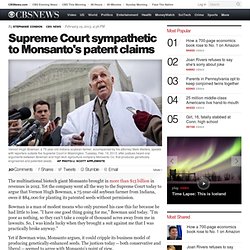
AP Photo/J. Scott Applewhite The multinational biotech giant Monsanto brought in more than $13 billion in revenues in 2012. Yet the company went all the way to the Supreme Court today to argue that Vernon Hugh Bowman, a 75-year-old soybean farmer from Indiana, owes it $84,000 for planting its patented seeds without permission. Bowman is a man of modest means who only pursued his case this far because he had little to lose. Yet if Bowman wins, Monsanto argues, it could cripple its business model of producing genetically-enhanced seeds. At issue is whether Monsanto's patents apply second-generation seeds and subsequent generations.